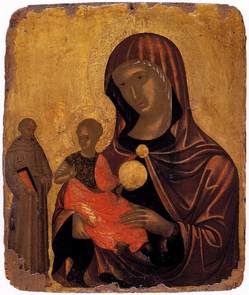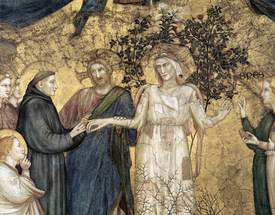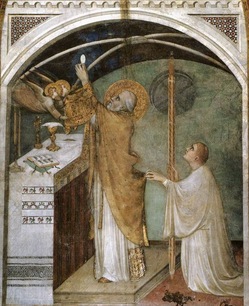During
this 800th anniversary year of the founding of the Franciscan Order,
Franciscans throughout the world have remembered the occasion with celebrations
and have also been reflecting on the demands of Franciscans today. Though
Franciscan life is expressed differently depending on one's state in life, five
basic commitments characterize all Franciscan's lives. These five commitments
offer a continuing challenge for renewal and recommitment to living the Franciscan
life which this anniversary year has helped to foster.


The first commitment is
that of leaving everything in order to follow Jesus. In fact, the first gospel
text which Francis and his brothers discovered in the Gospel book in the church
of St. Mary of the Angels, was the word Jesus addressed to the rich man
inviting him to leave everything, to distribute all of it to the poor, and then
to come follow him (Mt 19:21). Francis did this when he renounced his
inheritance before the Bishop, and Clare did this as well when she left her
family home to join the brothers at the Portiuncola. This commitment expresses
the conviction that there is nothing more important than following the
footprints of Jesus and living the gospel. But, for Francis and Clare this kind
of poverty was not an end in itself, but the basic requirement for living as
brothers and sisters with everyone and with all of creation.
Second, once
accepted into the brotherhood and sisterhood one was committed, "Through the
charity of the Spirit ... to serve and obey one another voluntarily," and they
were to "express the love they have for one another by their deeds...." This
style of authority and obedience practiced by the brothers and sisters was
placed in a context of mutuality-the minister must be a servant of the
brothers, and the other brothers must also serve and obey their minister.
Charity is of the essence of obedience according to Francis who summarized
Jesus' obedience in terms of his self-giving love first when he was born for us
in Bethlehem and when he gave himself on the cross for our sins, leaving us an
example to follow.


Third, the brothers and sisters practiced an ethic of
sufficiency. Relinquishing everything, they identified with the poor in terms
of their choice to live with them and to dress like them. The brothers
supported themselves by working, hiring themselves out primarily as
day-laborers. In payment they received only what was necessary for life, in
terms of food, drink, clothing, for themselves, for the brothers who were sick
or unable to work, and for the lepers and other poor. If they did not receive
enough for the day, only then could they beg. The logic of Franciscan living is
that if everyone took only what was necessary for the day, there would be
enough to go around for everyone. At the same time, this practice facilitated
brotherhood and sisterhood as Francis suggested: "Let each one confidently make
known his need to another; Let each one care and love for his brother as a
mother loves and cares for her son in which God has given the grace."


Fourth,
the brothers and sisters lived lives of mission. As they traveled about the
world, they met people where they found them, engaged with them in honest
conversation in the homes that were opened to them, and they ate and drank what
was set before them while they promoted peace. The brothers and sisters were
sustained by the Body and Blood of the Lord which accomplishes the
reconciliation and peace of all things with God. In this sense, the mission of
the brothers was "eucharistic," that is, the mission is to effect
reconciliation and peace, preaching primarily by deeds.
Finally, the brothers
and sisters were "Lesser Brothers and Sisters." They were to live lives subject
to all people in the world and church, as well as to the created order. This
implied a pattern of behavior as a lifestyle, and even more than a pattern of
behavior, it describes a way of being human-simple, without controlling others,
without controlling the created world. There is only one All-Powerful, and that
is the Father of Jesus Christ. This way of being human was the counter-example
to the greed and violence of so much of the society in Francis' day as well as
in ours, and this describes the real condition of the lepers, the poor and the
marginalized even today. Being subject does not imply a passive acceptance of
injustice and evil, but the choice to act humbly, patiently, and peacefully in
every situation.
These five elements have characterized Franciscan life and
practice for 800 years, since the time of Francis and Clare, and they challenge
us today to continue the legacy handed on to us so that we can entrust it to
those who will come after us in the future!
The author, Father Michael Blastic,
OFM, is a professor of Franciscan Studies at the Franciscan Institute, of St.
Bonaventure University. This
article was published in the the Winter 2009 issue of The Antonian.


Leave a comment